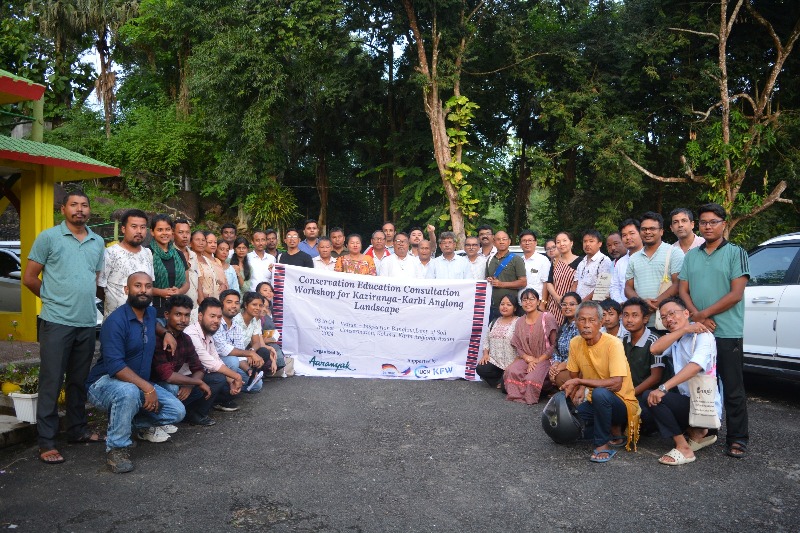GUWAHATI: Aaranyak, the region’s leading biodiversity conservation organization, hosted a two-day Conservation Education Planning Consultation for the Kaziranga-Karbi Anglong Landscape on August 3 and 4 in Kohora in Assam’s Karbi Anglong.
The workshop aimed at developing a strategic approach for conservation education through messages, media, tools and techniques to engage people of all ages in fostering a deep understanding of natural resources in the context of conservation, sustainable use of natural resources, and achieving ecological, economic, and social security for the overall well-being of the ecosystem and the community.
Resource persons and delegates from diverse sectors, including education, culture, academia, and social organizations within Karbi Anglong, were present at the two-day event.
Dr Jayanta Rongpi, Former MP, Karbi Anglong; Dr Dharamsing Teron, Director, Centre for Karbi Studies, Diphu; Holiram Terang, Former Cabinet Minister of Assam; Chandrakanta Terang, Ex MLA and Songwriter; Chandrasing Kro, President, Karbi Cultural Society; among others participated in the two-day workshop.
Representatives of the village community also participated in the workshop.
The sessions were moderated by Dr. Jayanta Kumar Sarma, Senior Programme Associate, Natural Resource Management Programme (NRMP) from Aaranyak.
Dr M. Firoz Ahmed, Scientist F & Coordinator of NRMP from Aaranyak, initiated the session by sharing the Community-Based Natural Resource Management (CBNRM) initiatives of Aaranyak that are being implemented in the Kohora and Diring area, thereby giving the participants an overall view of its initiative in KKL.
He emphasized how Aaranyak’s focus has shifted from specific fauna and flora conservation to a more holistic approach by engaging local communities to conserve their traditions and culture, preserve cultural integrity and heritage, and cultural ethos for future generations, aligning with the UN Sustainable Development Goals.
Participants collaborated in group discussions on six key themes: Natural Resource Management and Biodiversity Conservation; Village Institutions and Social Capital for Biodiversity and Livelihoods; Traditional Knowledge and Cultural Values for Natural Resource Management, Biodiversity Conservation, and Village Development; Traditional Knowledge, Culture, Values, Gender, Equity, and Village Development; Traditional Knowledge, Culture, Skills, and Youth Development; and Innovative Livelihoods in Harmony with Ecosystems, Nature, and Culture.
A key discussion during the workshop revolved around defining an Ideal Karbi Village “RongMarjong.” This comprehensive discussion included elements such as a defined village boundary and within that, a residential area, community forest (Rong Anglong/ Rong Angnam/ Namso pangjok) with important flora as per the Karbi culture, sacred groves (Pirda), cremation grounds (Thiri) situated away from residential areas, and a strong traditional village administration system led by Sarthe/ Rong asar.
During the workshop, participants were divided into two groups. One group explored ideas for developing Message-Media-Target (MMT) strategies, while the other concentrated on creating an ethical framework for Conservation Education and Communication (CEC) while engaging with Karbi communities.
The consultation was successful in establishing an exchange of dialogue between the community leaders, village leaders, and Aaranyak, with deep insights into the community’s specific needs in creating an ideal environment that fosters an understanding and practical approach to sustainable practices and coexistence.
The event was successfully managed by the NRMP team of Aaranyak along with volunteers from the village community.
Aaranyak is committed to the conservation of biodiversity, ecosystems and supporting the indigenous communities residing in Kaziranga- Karbi Anglong Landscape and Manas Landscape through the promotion of Alternative and Sustainable Livelihoods activities, education and awareness. The initiative is supported by IUCN – Kfw and USFWS.















